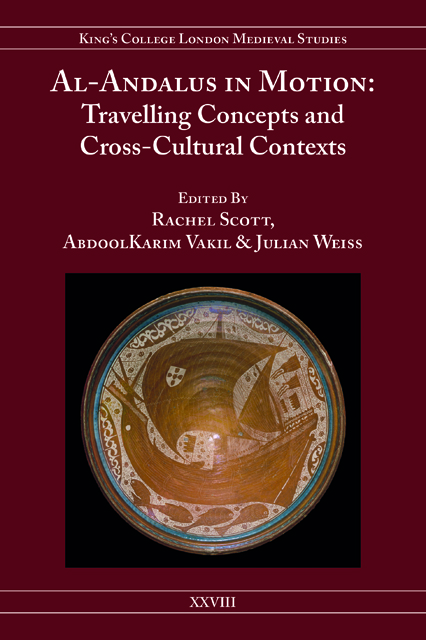Book contents
- Frontmatter
- Contents
- List of Illustrations
- Acknowledgements
- Notes on Contributors
- Part I Departure Points
- Part II Translating Al-Andalus: Travelling across Languages
- Part III (Re)Visions of Al-Andalus in Diaspora and Exile
- Part IV Andalusi Space as Node and Utopia: Europe, Islam, Empire
- Part V Al-Andalus and the Politics of Religious Identity
- Part VI Legacies, Landscapes and ‘Travel Buildings’
- Epilogue
- Index
Introduction: Concepts, Origins, Aims
Published online by Cambridge University Press: 02 June 2023
- Frontmatter
- Contents
- List of Illustrations
- Acknowledgements
- Notes on Contributors
- Part I Departure Points
- Part II Translating Al-Andalus: Travelling across Languages
- Part III (Re)Visions of Al-Andalus in Diaspora and Exile
- Part IV Andalusi Space as Node and Utopia: Europe, Islam, Empire
- Part V Al-Andalus and the Politics of Religious Identity
- Part VI Legacies, Landscapes and ‘Travel Buildings’
- Epilogue
- Index
Summary
‘Spain's medieval history’, argues Charles Hirschkind, serves ‘as means to pose questions in the present about the conceptual and moral boundaries of Europe’ (2014: 228). As contributions to this volume demonstrate, however, the part of this history represented by al-Andalus, or Medieval Iberia under Muslim rule, exists as a travelling concept on a far broader, global scale, extending well beyond the boundaries of Europe. The idea of ‘travelling concepts’ is of course itself a travelling concept par excellence, having been taken up by Edward Said (1983; but more importantly for us, 2000 [1994]), James Clifford (1989, 1997 [original lecture 1990]) and Mieke Bal (2002). In theorising al-Andalus our approach in this volume builds on their work as well as on more recent scholarship, such as Travelling Concepts for the Study of Culture by Birgit Neumann and Ansgar Nunning (2012), and the critical semantics projects led by Carol Gluck and Anna Lowenhaupt Tsing (2009), Roland Greene (2013) and Anston Cur Bosman (2018).
For Clifford, emphasising mobility and rethinking ‘culture’ in terms of travel means that ‘constructed and disputed historicities, sites of displacement, interference, and interaction, come more sharply into view’ (1997: 25; author's emphasis). As he suggests, the means by which a term or concept is put into circulation is never a neutral process, just as the language used to discuss such movements is necessarily compromised by the perspective from which it is viewed: ‘historically encumbered’, Clifford remarks, ‘with gendered, racial bodies, class privilege, specific means of conveyance, beaten paths, agents, frontiers, documents, and the like’ (1997: 39). Such a view finds a later echo in the work of Birgit Neumann and Ansgar Nunning, who state:
Approaches, theories and concepts in the study of culture are not only heavily imbued with, and shaped by, particular historical, intellectual and local traditions, they also come with ideological freight and often unconscious biases, as postcolonial theory and globalisation studies have amply demonstrated. (2012: 2)
Likewise, Mieke Bal describes how her thinking about concepts focuses on them
not so much as firmly established univocal terms but as dynamic in themselves. While groping to define, provisionally and partly, what a particular concept may mean, we gain insight into what it can do. (2002: 11; author's emphasis)
- Type
- Chapter
- Information
- Al-Andalus in MotionTravelling Concepts and Cross-Cultural Contexts, pp. 3 - 22Publisher: Boydell & BrewerPrint publication year: 2021



